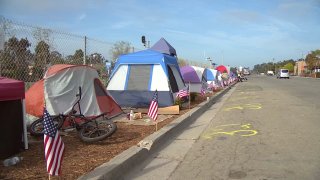
A Los Angeles City Council committee today approved an amendment to the city's sweeping law regulating locations of homeless encampments that would bar them within 500 feet of all schools.
The amendment, which still needs the approval of the full council, would update Municipal Code 41.18, which prohibits sitting, sleeping, lying or otherwise obstructing the public right of way in several areas of the city.
Those areas include within two feet of any fire hydrant or fire plug; within five feet of any operational or utilizable entrance or exit; within 10 feet of a loading dock or driveway; in a manner that interferes with any activity for which the city has issued a permit or restricts accessible passage as required by the Americans with Disabilities Act; or anywhere within a street, including bike paths.
The law already protects the public right of way within 500 feet of a "sensitive'' facility such as schools, day care facilities, parks and libraries, but only if each specific location is designated by the council for enforcement.
Get top local stories in Southern California delivered to you every morning. >Sign up for NBC LA's News Headlines newsletter.
The amendment approved Thursday by the council's Homelessness and Poverty Committee would be a blanket ban on encampments within 500 feet of all schools.
Councilman Joe Buscaino proposed such a move last year, but it never gained traction. But the issue was revived earlier this year, in part due to the urging of Los Angeles Unified School District Superintendent Alberto Carvalho, saying teachers, principals and parents have expressed concerns about homeless encampments near campuses.
"I've seen elementary schools with conditions that none of us as parents would find acceptable for children. Individuals with mental illness, some of them absolutely unclothed, shouting profanities in the listening ear of children,'' Carvalho told the council earlier.
Local
Get Los Angeles's latest local news on crime, entertainment, weather, schools, COVID, cost of living and more. Here's your go-to source for today's LA news.
He added that he was concerned about the "trauma'' and "long-term, short-term repercussions (and) impact on the psychological, cognitive development of children.''
Buscaino, who sits on the Homelessness and Poverty Committee, said approving the amendment will "ensure the most sacred placed among us, our playground and schools, are safe.''
"For me, the choice is clear, and you ought to not be surprised based
on where I'm coming from, because I called for this nearly a year ago,'' he
said ".... Let's move on this and get this done and protect our students, our
faculty and their parents.''
The committee approved the amendment on a 3-1 vote, with Councilwoman
Nithya Raman opposing.
Raman, who also opposed the original anti-camping measure last year, said she did not believe the amendment will effectively advance the city's battle against homelessness, noting a shortage of shelter beds that can house people being evicted from encampments that will be targeted by the law. She also pointed to the city's "scarce'' resources for addressing homelessness and enforcing such regulations and said the committee and council as a whole need to be focusing on more over-arching solutions to the issue of homelessness.
The city ordinance already in place also prohibits encampments and sleeping within:
- up to 500 feet of a designated overpass, underpass, freeway ramp, tunnel, bridge, pedestrian bridge, subway, wash or spreading ground, railroad track or where lodging unsheltered or in tents is unhealthy, unsafe and incompatible with safe passage; and
- up to 1,000 feet of a facility opened after Jan. 1, 2018 that provides shelter, safe sleeping, safe parking or navigation centers for persons experiencing homelessness.
- The ordinance also allows the city to prevent encampments for a period of no longer than one year in areas that are deemed an ongoing threat to public health or safety, including due to:
- death or serious bodily injury of any person at the location due to a hazardous condition
- repeated serious or violent crimes or threats of serious or violent crimes, including human trafficking; and
- fires at the location
People who violate the ordinance face an infraction or citation, but a "person who willfully resists, delays or obstructs a city employee from enforcing this section or who willfully refuses to comply after being requested to do so by an authorized city employee'' can face higher fines and a misdemeanor charge, according to the ordinance.



